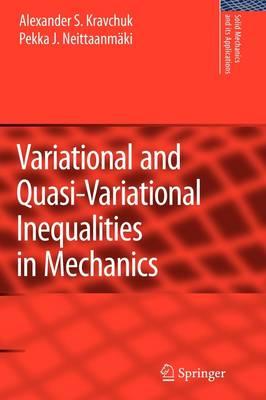Overview
The variational method is a powerful tool to investigate states and processes in technical devices, nature, living organisms, systems, and economics. The power of the variational method consists in the fact that many of its sta- ments are physical or natural laws themselves. The essence of the variational approach for the solution of problems rel- ing to the determination of the real state of systems or processes consists in thecomparisonofclosestates.Theselectioncriteriafortheactualstatesmust be such that all the equations and conditions of the mathematical model are satis?ed. Historically, the ?rst variational theory was the Lagrange theory created to investigate the equilibrium of ?nite-dimensional mechanical systems under holonomic bilateral constraints (bonds). The selection criterion proposed by Lagrange is the admissible displacement principle. In accordance with this principle, the work of the prescribed forces (supposed to be constant) on in?nitesimally small, kinematically admissible (virtual) displacements is zero. It is known that equating the virtual work performed for potential systems to zero is equivalent to the stationarity conditions for the total energy of the system. The transition from bilateral constraints to unilateral ones was performed by O. L. Fourier. Fourier demonstrated that the virtual work on small dist- bances of a stable equilibrium state of a mechanical system under unilateral constraints must be positive (or, at least, nonnegative). Therefore, for such a system the corresponding mathematical model is reduced to an inequality and the problem becomes nonlinear.
Full Product Details
Author: Alexander S. Kravchuk ,
Pekka J. Neittaanmäki
Publisher: Springer
Imprint: Springer
Edition: Softcover reprint of hardcover 1st ed. 2007
Volume: 147
Dimensions:
Width: 15.50cm
, Height: 1.80cm
, Length: 23.50cm
Weight: 0.581kg
ISBN: 9789048176199
ISBN 10: 9048176190
Pages: 337
Publication Date: 20 November 2010
Audience:
Professional and scholarly
,
Professional & Vocational
Format: Paperback
Publisher's Status: Active
Availability: Out of print, replaced by POD

We will order this item for you from a manufatured on demand supplier.
Reviews
From the reviews: The main idea of the presented monograph is to deal with mathematical models connected with mechanical systems under unilateral constraints. ! Examples of analytical and numerical solutions are presented. Numerical solutions were obtained using the finite element and boundary element methods. ! The text contains a big amount of latest results achieved in mathematical modeling of contact problems in mechanics together with applications. It can be recommended both to graduate students and the researchers in applied mathematics and mechanics. (Igor Bock, Zentralblatt MATH, Vol. 1131 (9), 2008) The aim of this interesting book is the study of problems in the mathematical modelling of mechanical systems ! . The work is intended for a wide audience: this would include specialists in contact processes in structural and mechanical systems ! as well as those with a background in the mathematical sciences who seek a self-contained account of the mathematical theory of contact mechanics. The text is suitable for graduate students and researchers in applied mathematics, computational mathematics, and computational mechanics. (Jan Lovisek, Mathematical Reviews, Issue 2009 e)
From the reviews: The main idea of the presented monograph is to deal with mathematical models connected with mechanical systems under unilateral constraints. ... Examples of analytical and numerical solutions are presented. Numerical solutions were obtained using the finite element and boundary element methods. ... The text contains a big amount of latest results achieved in mathematical modeling of contact problems in mechanics together with applications. It can be recommended both to graduate students and the researchers in applied mathematics and mechanics. (Igor Bock, Zentralblatt MATH, Vol. 1131 (9), 2008) The aim of this interesting book is the study of problems in the mathematical modelling of mechanical systems ... . The work is intended for a wide audience: this would include specialists in contact processes in structural and mechanical systems ... as well as those with a background in the mathematical sciences who seek a self-contained account of the mathematical theory of contact mechanics. The text is suitable for graduate students and researchers in applied mathematics, computational mathematics, and computational mechanics. (Jan Lovisek, Mathematical Reviews, Issue 2009 e)
From the reviews: The main idea of the presented monograph is to deal with mathematical models connected with mechanical systems under unilateral constraints. ! Examples of analytical and numerical solutions are presented. Numerical solutions were obtained using the finite element and boundary element methods. ! The text contains a big amount of latest results achieved in mathematical modeling of contact problems in mechanics together with applications. It can be recommended both to graduate students and the researchers in applied mathematics and mechanics. (Igor Bock, Zentralblatt MATH, Vol. 1131 (9), 2008) The aim of this interesting book is the study of problems in the mathematical modelling of mechanical systems ! . The work is intended for a wide audience: this would include specialists in contact processes in structural and mechanical systems ! as well as those with a background in the mathematical sciences who seek a self-contained account of the mathematical theory of contact mechanics. The text is suitable for graduate students and researchers in applied mathematics, computational mathematics, and computational mechanics. (Jan LoviA!ek, Mathematical Reviews, Issue 2009 e)




